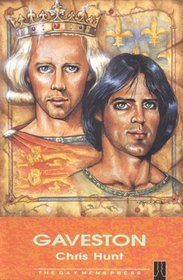Helpful Score: 1
Told from Edward II's point of view, Gaveston relates the life of his friend and lover from the time of his arrival in England as a teenager until his murder during the early years of Edward's reign. Edward's attraction is immediate.
"Piers Gaveston was the most beautiful creation on God's earthâ¦. [He] had eyes as green as emeralds and a smile that dazzled like the sunâ¦."
But Gaveston's beauty was to be, in Edward's eyes, his curse. For as much as Edward loves him, others seethe with anger over his special treatment. They resent the gifts Edward bestows on him. They further blame him for Edward's inattention to important matters ranging from securing his inheritance to dealing with the Scottish wars.
In time, Edward's cousin, Thomas, Earl of Lancaster, and Guy de Beauchamp, Earl of Warwick, conspire to capture and kill Gaveston. But the story doesn't end quite at this point. There's a brief accounting of Edward's later relationship with Hugh le Despenser and a 4-paragraph epilogue on Roger Mortimer's and Isabelle's (Edward's queen) imprisonment of Edward.
While the author's knowledge of the subject is impressive and her inventions (Thomas' and Edward's youthful sexual experiments) make sense in light of the story, I find myself unable to recommend it without qualification except to those who never tire of reading about this time period or these characters.
The problem with the novel is threefold: While well-researched, it never really breaks out of the gay historical romance model. The sex is often, explicit and largely unnecessary. Second, while Edward clearly was a weak ineffectual king, his portrayal as an immature, petulant, sniveling man who can't get Gaveston's nether parts out of his head grates.
Third, telling the story from Edward's point of view sometimes made it farcical. For instance, at the end of a section where Edward tells about leaving England to marry Isabelle, he says, âI simply cannot understand why so many people took offence when I left him [Gaveston] regent in my absence.â While Edward lacked good judgment, this remark makes him stupid.
"Piers Gaveston was the most beautiful creation on God's earthâ¦. [He] had eyes as green as emeralds and a smile that dazzled like the sunâ¦."
But Gaveston's beauty was to be, in Edward's eyes, his curse. For as much as Edward loves him, others seethe with anger over his special treatment. They resent the gifts Edward bestows on him. They further blame him for Edward's inattention to important matters ranging from securing his inheritance to dealing with the Scottish wars.
In time, Edward's cousin, Thomas, Earl of Lancaster, and Guy de Beauchamp, Earl of Warwick, conspire to capture and kill Gaveston. But the story doesn't end quite at this point. There's a brief accounting of Edward's later relationship with Hugh le Despenser and a 4-paragraph epilogue on Roger Mortimer's and Isabelle's (Edward's queen) imprisonment of Edward.
While the author's knowledge of the subject is impressive and her inventions (Thomas' and Edward's youthful sexual experiments) make sense in light of the story, I find myself unable to recommend it without qualification except to those who never tire of reading about this time period or these characters.
The problem with the novel is threefold: While well-researched, it never really breaks out of the gay historical romance model. The sex is often, explicit and largely unnecessary. Second, while Edward clearly was a weak ineffectual king, his portrayal as an immature, petulant, sniveling man who can't get Gaveston's nether parts out of his head grates.
Third, telling the story from Edward's point of view sometimes made it farcical. For instance, at the end of a section where Edward tells about leaving England to marry Isabelle, he says, âI simply cannot understand why so many people took offence when I left him [Gaveston] regent in my absence.â While Edward lacked good judgment, this remark makes him stupid.




